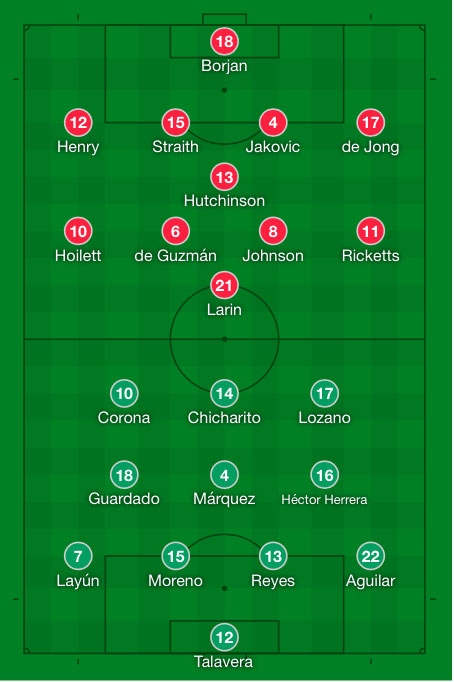Mar 26, 2016
Loss to Mexico shouldn’t shift Canada's focus
It could well be that the biggest moment for Canadian Soccer on Friday night took place over six thousand miles from Vancouver in El Salvador. It was a special night for the sport in this country at BC Place. A record-breaking crowd of over 54,000 was in attendance to watch a men’s World Cup qualifying game in Canada. It is worth letting that sink in for a moment.

It could well be that the biggest moment for Canadian Soccer on Friday night took place over six thousand miles from Vancouver in El Salvador.
It was a special night for the sport in this country at BC Place. A record-breaking crowd of over 54,000 was in attendance to watch a men’s World Cup qualifying game in Canada. It is worth letting that sink in for a moment.
In the end Mexico came to Canada and did what most expected them to do, by completely outclassing the home side in an emphatic 3-0 victory. El Tri were outstanding and pounced on Canada’s weaknesses from an early stage. They will likely do the same again on Tuesday in Mexico City and Canada at that point will hope that they run the table in the group and finish with six wins from six.
Meanwhile, elsewhere in Group A of this fourth round of CONCACAF World Cup qualifying Nelson Bonilla scored a late equaliser for the home team to deny Honduras of all three points.
It leaves the group – with the top two progressing to the final stages - at the halfway stage tantalizingly poised with Mexico on 9pts, Canada 4, El Salvador 2 and Honduras 1. Bonilla’s diving header secured a couple of things far more valuable than anything Canada did in Vancouver. With Benito Floro’s side having to play back-to-back away games in Mexico and Honduras next, the realistic goal was always to host El Salvador with a chance to qualify while still on four points. Bonilla’s goal sets that up. The ideal situation for Canada is for neither Honduras nor El Salvador to get to 7pts and the best way for that to play out was for them to draw both their games. Part one of two has been accomplished. Canada needed Honduras to remain in disarray and they were crushed leaving the field in San Salvador.
If Honduras win at home to El Salvador and beat Canada they still head to Mexico on the last day with seven points, meaning they cannot eliminate Canada in the fifth game. The only scenario left for Canada to not make their last game meaningful, should they lose the next two away games, is if El Salvador wins in Honduras and beat Mexico, which are unlikely.
On a night when many Mexicans put on a clinic at BC Place it is easy to not have the group scenario clear at the forefront of our minds but it should be. Instead, we could count the many ways highlighting the massive disparity in talent between the two teams but none of that should come as a shock to anyone.
Starting XI’s

Mexico boss Juan Carlos Osorio named nine players who were at the World Cup in Brazil in his starting XI and six of them started the last 16 knockout game against the Dutch when they were two minutes away from making the quarterfinals. All six of them were excellent on this night, particularly full backs Paul Aguilar and Miguel Layun, the game’s best player, who helped the visitors dominate in wide areas and support the young, dynamic stars further forward, Hirving Lozano and Jesus Manuel Corona.
Canadian goalkeeper Milan Borjan kept the score respectable in the first half, although he may well be disappointed with his positioning on the second goal and his handling on the third. Mexico took their chances and Canada didn’t. Cyle Larin, Junior Hoilett and Atiba Hutchinson all had moments in a frantic opening half that was played at incredible intensity that suited Mexico. Canada had a game plan to keep the ball in their own half, asking their defenders to play a part in a possession game but they were unable to adapt to the ferocious pace and change to the game’s conditions. Their wide players in attack weren’t supported enough by full-backs concerned about their defensive responsibilities and very few long balls were played over the top to help someone like Junior Hoilett use his speed.
It has been easy to be critical of Canada in the past. To target long-term development, to ask key questions about why they aren’t better, but this was not a night for that. Instead, it was a night of promise. A night where Canadian men’s soccer can push themselves and their federation to ensure these events at home are not so rare in the future. The reason they want to reach the next stage shouldn’t simply be to be ‘one step closer to Russia’. It should be to get five more home games like this. To improve they must get more and more challenges like the one Mexico gave them, or, perhaps for their own sake, ones slightly easier given by other top teams in the region.
It is worth looking at the progress Ecuador and Venezuela, for example, have made in the last two decades based around the South American World Cup qualifying structure where 10 teams all play each other twice. These teams have benefited dramatically by consistently matching stronger teams in their region in meaningful matches. CONCACAF could easily put in a similar system by having eight winners from round three – rather than the six now – joining the top six seeds for a ten team tournament to play out on the same dates as South America. Far too many World Cup qualifying campaigns in other regions around the world are predictable and long and in an era where the international side of the sport continues to battle with the money and fame of the club side it needs to learn how to freshen up its tournaments to ensure as many games as possible are important.
Canada, of course, would be a borderline candidate at this stage to reach the top ten in their region but their third round two-legged game would be enormous with the prospect of playing so many competitive games afterwards, including guaranteed home games against giants like Mexico and USA each time. On Friday night in Vancouver the team may have struggled to show they can be a powerhouse on the field but off it the CSA and the people of Canada showed they are ready for a big stage on a more regular occasion.
If Canada can come out on top in a three-team tournament featuring El Salvador and Honduras those nights will come soon. Forget Mexico, that still has to be the main goal.
